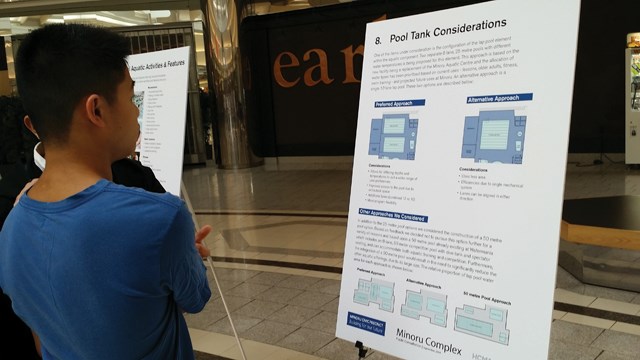The way the City of Richmond and its council has engaged and consulted with its citizens has drawn fire from several campaigns in the early lead up to the municipal election in November.
Why do people say they feel no sense of empowerment in how this city is progressing? In their busy lives, what more can city councillors actually do to be more responsive?
The Richmond News looks at three recent projects that have drawn criticism.
From the day the city tried to reach a deal to develop the Garden City Lands, the future park has always been a hot-button topic.
Jim Wright, president of the Garden City Lands Coalition, believes many of the consultation surveys have been skewed toward what the city wants to ultimately see; that, or staff is ill informed, but Wright prefers to believe the former.
“It seems as though as long as they can check off ‘consultation’ then that’s okay. But we need meaningful consultation,” said Wright.
Across the way, in West Cambie, Wright noted another survey for a plot of land that could have become a park, was also biased.
“It only asked if (the residents) wanted townhouses or townhouses plus apartment buildings,” chuckled Wright.
John Roston, an outspoken critic of the rezoning application by developer Onni for Imperial Landing at the Steveston boardwalk, said the problem with public consultation seems to be specifically with rezoning.
“I think there is a huge flaw in how the city deals with public consultation when it comes to rezoning, and that is they leave it up to the applicant,” he said.
The Steveston resident said the city has relied heavily on the developer’s own consultation methods, which he says have favoured commercial retail options.
“Onni rigs the questions they ask to get the answers they want,” said Roston.
He noted it’s ironic city councillors have complained about the province’s consultation process on the jet fuel facility when he believes the same kind of process occurs at the municipal level.
That said, Roston believes there are a myriad of opportunities to give feedback on other issues.
“The city does get good feedback when it wants to but certainly not on rezoning,” citing the numerous presentations at community centres and civic events.
More recently, city council broke ground on an $80 million (including park renovations) aquatics and seniors facility at Minoru Park.
Council candidate Alexa Loo and many others have questioned the city’s decision to move ahead without a 50-metre pool in the facility.
“I think the vision with what was wanted was decided and the (consultation) questions helped drive the end result to make them feel engaged. I think there was a better way to engage,” said Loo.
It was last November when city staff told councillors the layout could be changed during the public consultation and design phase.
Instead, what happened was a 50-metre option at last month’s open houses fell under the category of “other approaches we considered.”
In other words, city staff had considered the pool option with the Minoru Major Stakeholder Advisory Committee but ruled it out before the public were allowed to voice an opinion.
The advisory committee is made up of members from the aquatics services board and Minoru Seniors’ Centre, in addition to two councillors and five members of the general public.
Loo argued that, that was too select a group, that there should have been broader engagement, especially with younger citizens.
Furthermore, Loo’s concerns don’t even address whether or not such a large, costly project should have gone ahead to begin with, without broader consultation and/or a public hearing.
Despite all this, Ted Townsend, City of Richmond spokesperson and head of the city’s communications department, said there is a ”tremendous” amount of engagement that goes into the community.
“It’s like an iceberg. Some only see the part that tips out. But there’s a lot of engagement happening,” said Townsend.
From social media, emails, online forums, phone calls and old-fashioned letters, residents are able to voice their opinions on matters important to them.
But gauging the value of these feedback mechanisms is subjective at best.
As it stands, Townsend said his department is actively focused on increasing social media engagement, be it through organic or purchased methods.
City staff is also pushing online forums as a way to engage, such as Let’s Talk Richmond (letstalkrichmond.ca), although Townsend acknowledges the visits are low. He did note visits to the website are steadily climbing.
The city relies on advisory committees, formed by citizens. But currently the city is having trouble filling some of these committees, not to mention finding new members as not to have repetition (committees have two-year terms in order to provide varied opinions).
Townsend said the city also shares decision making with community groups and associations. Most candidates have shown interest in handing over more power to such groups, but detailed solutions remain few and far between.
So what are the solutions?
Do community groups need more power? Does the city need more public hearings, especially before deciding to move ahead on large projects, particularly ones that heavily impact neighbourhoods and/or cost tens of millions of dollars?
And yet, how do you engage more but not hold up progress? Does the city’s website need more, clearer information on projects?
How can councillors be more responsive? Should they have a public cell phone? Do they need to be forced to respond to one’s emails in a meaningful and timely manner? Do they need to be more active on social media?
The answers may vary, but political pledges to be open and engaging is sure to be constant leading up to the November vote.



